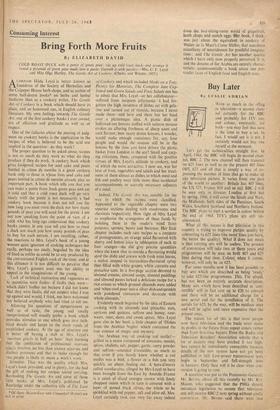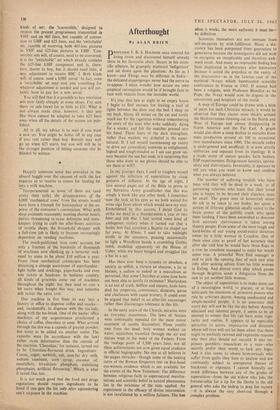Buy Later
By LESLIE ADRIAN
WITH so much in the offing in television—a second chan- nel certainly . for the BBC and probably for ITV too, and colour, eventually, for both—you may feel that now is the time to buy a set. In fact, I would say it is not. I certainly would not buy one myself at the moment.
.Let's get the technicalities straight first. In April, 1964, the BBC will begin its second chan- nel, BBC 2. The new channel will then transmit on 625 lines as well as on the present 405 lines (405, 625 and all that is simply a way of ex- pressing the number of lines that go to make up any television picture. It varies, from one part of the world to another: Britain has 405 tines, . the US 525, France 819 and so on). BBC 2 will be seen only in Greater. London at first but by spring, 1966, ii Will cover the South and Vs/est, the Midlands, both Sidei of the Pennines, South Wales, Southern Scotland and Northern Ireland. The BBC plans tit Start a service in colour before the end of 1964. MTV's plans are still un- announced.
What all this means is that television in this country is trying to improve picture quality by converting to 625 lines (the more lines you have, the better the qttality). What it 'does not mean is that existing sets will be useless. The process of conversion 'will' take two or three years and prOgrammes will be seen on both 405 and 625 lines during that' time. Colour; . when it conies, however, will only be on 625.
for some months now it has been possible to buy sets which are described as being 'ready' to take 625-line programmes. This, I'm afraid, has not , been .an entirely accurate description. Many sets which have been described as 'con- vertible' w ill in fact cost up to f20 to convert and there will be an additional charge for a new aerial and for the installation of it. The aerials for 625, by the way, will be outdoor ones and will be uglier and more expensive than the present ones.
The reason for all this is that most people now have television and the trade must make its profits in the future from repeat orders rather than from first-time buyers. Even the Radio and Television Retailers' Association admits that a lot of dealers may have pitched it too high. Sets cannot be immediately convertible because details of the new system have not yet been published in full. Low-power transmission tests begin in September and full-strength tests in January. Only then will it be clear what con- version is going to cost.
A question was put to the Postmaster-General, Mr. Bevins, about all this recently by Mr. Roy Mason, who suggested that the PMG should introduce legislation to. ensure that television sets will receive BBC 2 next spring without costly conversion. Mr. Bevins said there were two kinds of set: the 'convertible,' designed to receive the present programmes transmitted in VHF and on 405 lines, but capable of conver- sion to UHF and 625 lines, and the `switchable' set, capable of receiving both 405-line pictures in VHF and 625-line pictures in UHF. 'Con- vertible sets will, of course, need to be converted; it is the "switchable" set which already contains the 625-line. UHF component and is, there- fore, dearer to buy, but it should need little, if any, adjustment to receive BBC 2. Both kinds will, of course, need a UHF aerial.' In fact, even a `switchable' set may cost you something for whatever adjustment is needed and you will cer- tainly have to pay for a new aerial.
You will find that it is possible to buy television sets now fairly cheaply at some shops. I've seen them on sale (new) for as little as £31. What is not always made clear, however, is that sets like these cannot be adapted to take 625 lines even when all the details of the system are pub- lished.
All in all, my advice is to wait if you want a new set. You might be better off in any case if you rent rather than buy. Rentals may well go up when 625 starts, but you will still be in the stronger position of letting someone else be blinded by science.
Happily common sense has prevailed in the absurd haggle over the amount of milk the law requires us to receive in return for feeding 6d. into a milk machine.
Temperamental as some of them are (and costly their milk), the disappearance of the 6,000 'mechanical cows' from the streets would have been a triumph for bureaucracy at the ex- pense of the consumer's convenience. What with shop assistants reasonably wanting shorter hours, dairies threatening to cease deliveries and store- keepers trying to curb the after-hours activities of mobile shops, the household shopper with a full-time job is likely to become increasingly dependent on vending machines.
The much-publicised 'iron cows' account for only a fraction of the hundreds of thousands of machines now chinking up a turnover reck- oned by some to be about £10 million a year. From these mechanical cornucopia has been streaming a strange assortment of merchandise: light bulbs and stockings, paperbacks and even tote tickets at Sandown. In bedsitter country, all kinds of groceries come out of machines throughout the night; but they tend to cost a bit more when bought this way, and suburbia still resists the extra cost.
One machine in five finds its way into a factory or office to dispense coffee and snacks— and, incidentally, to dispense with the tea-lady, along with the tea-break. One of the nastier office machines of my acquaintance proclaimed a choice of coffee, chocolate or soup. What arrived through the slot was a capsule of greyish powder, hot water to be added via another outlet. The capsules were (in accordance with the law) rather more informative than the outside of the machine. 'Chocolate,' for instance, turned out to be 'Chocolate-flavoured drink. Ingredients: Cocoa, sugar, sorbitol, salt, non-fat dry milk, sodium caseinate, corn syrup, coconut oil, emulsifiers, tri-calcium phosphate, stabilising phosphates, artificial flavouring.' Which is what it tasted like, too.
It is not much good that the food and drugs regulations should require ingredients to be listed if one gets the list only after squandering one's sixpence in the machine.







































 Previous page
Previous page